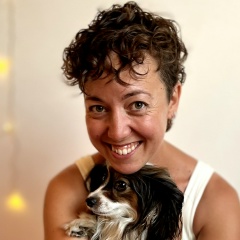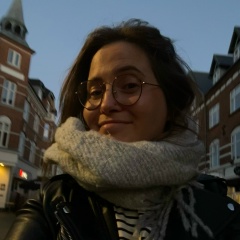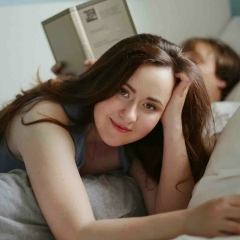О русской логике
Тут говорят, русский язык логичнее. А попробуйте объяснить французу, почему стакан на столе стоит, вилка лежит, а птичка на дереве сидит.
Со стаканом и вилкой я тут же вывела теорию: то, что скорее вертикальное, чем горизонтальное – оно стоит; то, что скорее горизонтальное, чем вертикальное - оно лежит. Моя теория тут же разбилась о тарелку – она скорее горизонтальная, чем вертикальная, но стоит. Хотя, если её перевернуть, то будет лежать. Тут же на ходу выводится еще одна теория: тарелка стоит, потому что у неё есть основание, она стоит на основании. Теория немедленно разбивается в хлам о сковородку – у нее нет основания, но она всё равно стоит. Чудеса. Хотя если её засунуть в мойку, то там она будет лежать, приняв при этом положение более вертикальное, чем на столе. Отсюда напрашивается вывод, что всё, что готово к использованию, стоит. (На этом месте хочется сказать пошлость.)
Но вот возьмём еще один предмет – мяч обыкновенный детский. Он не горизонтальный и не вертикальный, при этом полностью готов к использованию. Кто же скажет, что там, в углу, мяч стоит? Если мяч не выполняет роль куклы и его не наказали, то он всё-таки лежит. И даже если его перенести на стол, то и на столе (о чудо!) он будет лежать. Усложним задачу – положим мяч в тарелку, а тарелку в сковородку. Теперь у нас мяч по-прежнему лежит (в тарелке), сковородка по-прежнему стоит (на столе), вопрос, что делает тарелка?
Если француз дослушал объяснение до конца, то всё, его мир уже никогда не будет прежним. В нём появились тарелки и сковородки, которые умеют стоять и лежать – мир ожил. Осталось добавить, что птички у нас сидят. На ветке, на подоконнике и даже на тротуаре. Француз нарисует в своем воображении синицу, сидящую на ветке на пятой точке и болтающую в воздухе лапками, или бомжующую ворону, сидящую, вытянув лапы и растопырив крылья, у станции метро. «Русские – вы сумасшедшие!» - скажет француз и закинет в вас учебником.
Тут говорят, русский язык логичнее. А попробуйте объяснить французу, почему стакан на столе стоит, вилка лежит, а птичка на дереве сидит.
Со стаканом и вилкой я тут же вывела теорию: то, что скорее вертикальное, чем горизонтальное – оно стоит; то, что скорее горизонтальное, чем вертикальное - оно лежит. Моя теория тут же разбилась о тарелку – она скорее горизонтальная, чем вертикальная, но стоит. Хотя, если её перевернуть, то будет лежать. Тут же на ходу выводится еще одна теория: тарелка стоит, потому что у неё есть основание, она стоит на основании. Теория немедленно разбивается в хлам о сковородку – у нее нет основания, но она всё равно стоит. Чудеса. Хотя если её засунуть в мойку, то там она будет лежать, приняв при этом положение более вертикальное, чем на столе. Отсюда напрашивается вывод, что всё, что готово к использованию, стоит. (На этом месте хочется сказать пошлость.)
Но вот возьмём еще один предмет – мяч обыкновенный детский. Он не горизонтальный и не вертикальный, при этом полностью готов к использованию. Кто же скажет, что там, в углу, мяч стоит? Если мяч не выполняет роль куклы и его не наказали, то он всё-таки лежит. И даже если его перенести на стол, то и на столе (о чудо!) он будет лежать. Усложним задачу – положим мяч в тарелку, а тарелку в сковородку. Теперь у нас мяч по-прежнему лежит (в тарелке), сковородка по-прежнему стоит (на столе), вопрос, что делает тарелка?
Если француз дослушал объяснение до конца, то всё, его мир уже никогда не будет прежним. В нём появились тарелки и сковородки, которые умеют стоять и лежать – мир ожил. Осталось добавить, что птички у нас сидят. На ветке, на подоконнике и даже на тротуаре. Француз нарисует в своем воображении синицу, сидящую на ветке на пятой точке и болтающую в воздухе лапками, или бомжующую ворону, сидящую, вытянув лапы и растопырив крылья, у станции метро. «Русские – вы сумасшедшие!» - скажет француз и закинет в вас учебником.
About Russian logic
They say Russian is more logical. And try to explain to the Frenchman why the glass is on the table, the fork is lying, and the bird is sitting on the tree.
With a glass and a fork, I immediately deduced the theory: that which is more vertical than horizontal - it stands; that which is more horizontal than vertical - it lies. My theory immediately broke on a plate - it is more horizontal than vertical, but worth it. Although, if you turn it over, it will lie. Immediately on the move, another theory is deduced: the plate stands, because it has a basis, it stands on the basis. The theory immediately breaks into rubbish about a frying pan - it has no basis, but it still stands. Wonders. Although if you put it in the sink, then it will lie there, taking at the same time the position is more vertical than on the table. This suggests the conclusion that everything that is ready to use is worth it. (At this point I want to say vulgarity.)
But here we take one more thing - an ordinary children's ball. It is neither horizontal nor vertical, while it is completely ready for use. Who will say that there, in the corner, the ball is standing? If the ball does not fulfill the role of a doll and has not been punished, then it still lies. And even if it is transferred to the table, then on the table (lo and behold!) It will lie. Let's complicate the task - put the ball in a plate, and the plate in a pan. Now we still have the ball (in the plate), the pan is still standing (on the table), the question is, what does the plate do?
If a Frenchman listens to the explanation to the end, then everything, his world will never be the same again. Plates and pans appeared in it that know how to stand and lie - the world came to life. It remains to add that the birds are sitting with us. On a branch, on a windowsill, and even on the sidewalk. The Frenchman will draw in his imagination a tit sitting on a branch at the fifth point and dangling in the air with its paws, or a homeless crow, sitting with outstretched paws and spread its wings, at the metro station. “Russians - you are crazy!” - the Frenchman will say and will throw a textbook at you.
They say Russian is more logical. And try to explain to the Frenchman why the glass is on the table, the fork is lying, and the bird is sitting on the tree.
With a glass and a fork, I immediately deduced the theory: that which is more vertical than horizontal - it stands; that which is more horizontal than vertical - it lies. My theory immediately broke on a plate - it is more horizontal than vertical, but worth it. Although, if you turn it over, it will lie. Immediately on the move, another theory is deduced: the plate stands, because it has a basis, it stands on the basis. The theory immediately breaks into rubbish about a frying pan - it has no basis, but it still stands. Wonders. Although if you put it in the sink, then it will lie there, taking at the same time the position is more vertical than on the table. This suggests the conclusion that everything that is ready to use is worth it. (At this point I want to say vulgarity.)
But here we take one more thing - an ordinary children's ball. It is neither horizontal nor vertical, while it is completely ready for use. Who will say that there, in the corner, the ball is standing? If the ball does not fulfill the role of a doll and has not been punished, then it still lies. And even if it is transferred to the table, then on the table (lo and behold!) It will lie. Let's complicate the task - put the ball in a plate, and the plate in a pan. Now we still have the ball (in the plate), the pan is still standing (on the table), the question is, what does the plate do?
If a Frenchman listens to the explanation to the end, then everything, his world will never be the same again. Plates and pans appeared in it that know how to stand and lie - the world came to life. It remains to add that the birds are sitting with us. On a branch, on a windowsill, and even on the sidewalk. The Frenchman will draw in his imagination a tit sitting on a branch at the fifth point and dangling in the air with its paws, or a homeless crow, sitting with outstretched paws and spread its wings, at the metro station. “Russians - you are crazy!” - the Frenchman will say and will throw a textbook at you.
У записи 76 лайков,
22 репостов.
22 репостов.
Эту запись оставил(а) на своей стене Ольга Зайцева




































































